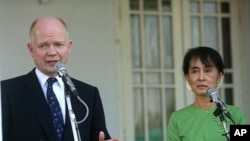British Foreign Secretary William Hague, on a visit to Burma, says European Union economic sanctions will not change until authorities release all political prisoners. The top British diplomat made the comments after holding separate meetings with democracy leader Aung San Suu Kyi and Burma’s military-backed leaders.
Hague held talks Friday morning with Burma’s opposition and Aung San Suu Kyi at her lakeside home in Rangoon. Hague’s visit is the first in more than 50 years by the former colonial power’s top diplomat.
Following the meeting, the British foreign secretary told reporters it was an exciting time in Burma as there was a real chance for democracy in the country after decades of military rule.
He voiced support for the government’s reform efforts, including opening a dialogue with Aung San Suu Kyi, loosening its iron grip on the media, allowing labor unions, and releasing some political prisoners.
But, Hague said much more needs to be done, in particular, giving freedom to all remaining political prisoners, estimated to be in the hundreds. He acknowledged widespread disappointment this week with the government’s Independence Day amnesty, which saw only about 30 such prisoners released.
“It is not possible to say a country is free and democratic while people are still in prison on grounds of their political beliefs. And, so it is vital for such prisoners to be released if European Union restrictive measures are to be changed,” Hague said.
The EU and United States limit diplomatic relations, trade and investments with Burma because of the military’s violent suppression of democracy movements. But expectations are growing that those restrictions could soon be relaxed.
The EU announced Thursday it would open a representative office in Burma to manage humanitarian aid programs and facilitate political dialogue.
Hague met the same day with leaders of the government, including President Thein Sein, who promised all political prisoners would be released without giving a timetable.
His government is also allowing Aung San Suu Kyi and her National League for Democracy to contest by-elections in April after being sidelined from the historic 2010 election. The Nobel Prize winner told reporters Friday her goals were clear.
“All political prisoners should be released and there should be all efforts made to put an end to ethnic conflict within our country," she said. "And, certainly we would like to see free and fair by-elections. And, I must add I would like to see the NLD winning very well in those elections.”
Aung San Suu Kyi was under house arrest for most of the past two decades for challenging military rule and was banned from contesting office.
She was released just days after the 2010 election. Her NLD won Burma’s previous election in 1990 but the military refused to give up power.
Britain to Maintain Sanctions Until Burma Frees Political Prisoners













